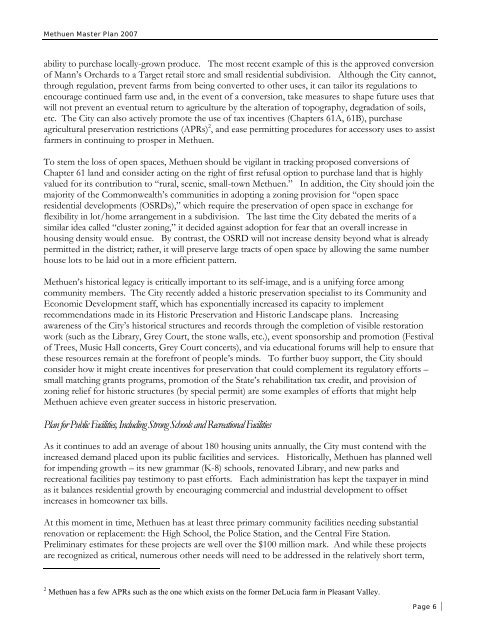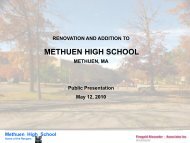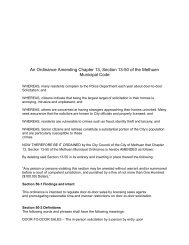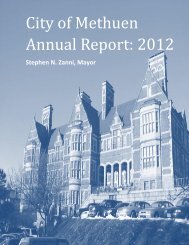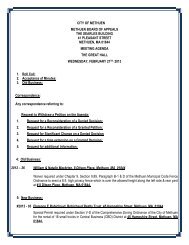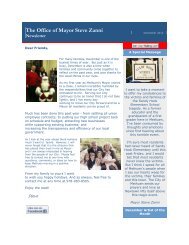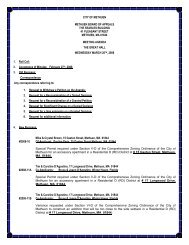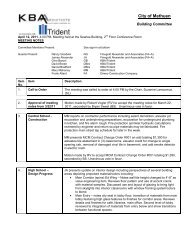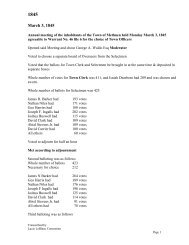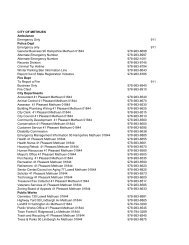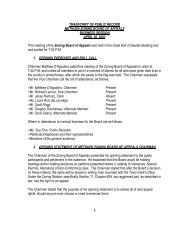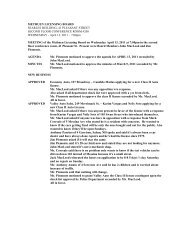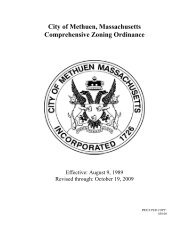City of Methuen Master Plan
City of Methuen Master Plan
City of Methuen Master Plan
Create successful ePaper yourself
Turn your PDF publications into a flip-book with our unique Google optimized e-Paper software.
<strong>Methuen</strong> <strong>Master</strong> <strong>Plan</strong> 2007<br />
ability to purchase locally-grown produce. The most recent example <strong>of</strong> this is the approved conversion<br />
<strong>of</strong> Mann’s Orchards to a Target retail store and small residential subdivision. Although the <strong>City</strong> cannot,<br />
through regulation, prevent farms from being converted to other uses, it can tailor its regulations to<br />
encourage continued farm use and, in the event <strong>of</strong> a conversion, take measures to shape future uses that<br />
will not prevent an eventual return to agriculture by the alteration <strong>of</strong> topography, degradation <strong>of</strong> soils,<br />
etc. The <strong>City</strong> can also actively promote the use <strong>of</strong> tax incentives (Chapters 61A, 61B), purchase<br />
agricultural preservation restrictions (APRs) 2 , and ease permitting procedures for accessory uses to assist<br />
farmers in continuing to prosper in <strong>Methuen</strong>.<br />
To stem the loss <strong>of</strong> open spaces, <strong>Methuen</strong> should be vigilant in tracking proposed conversions <strong>of</strong><br />
Chapter 61 land and consider acting on the right <strong>of</strong> first refusal option to purchase land that is highly<br />
valued for its contribution to “rural, scenic, small-town <strong>Methuen</strong>.” In addition, the <strong>City</strong> should join the<br />
majority <strong>of</strong> the Commonwealth’s communities in adopting a zoning provision for “open space<br />
residential developments (OSRDs),” which require the preservation <strong>of</strong> open space in exchange for<br />
flexibility in lot/home arrangement in a subdivision. The last time the <strong>City</strong> debated the merits <strong>of</strong> a<br />
similar idea called “cluster zoning,” it decided against adoption for fear that an overall increase in<br />
housing density would ensue. By contrast, the OSRD will not increase density beyond what is already<br />
permitted in the district; rather, it will preserve large tracts <strong>of</strong> open space by allowing the same number<br />
house lots to be laid out in a more efficient pattern.<br />
<strong>Methuen</strong>’s historical legacy is critically important to its self-image, and is a unifying force among<br />
community members. The <strong>City</strong> recently added a historic preservation specialist to its Community and<br />
Economic Development staff, which has exponentially increased its capacity to implement<br />
recommendations made in its Historic Preservation and Historic Landscape plans. Increasing<br />
awareness <strong>of</strong> the <strong>City</strong>’s historical structures and records through the completion <strong>of</strong> visible restoration<br />
work (such as the Library, Grey Court, the stone walls, etc.), event sponsorship and promotion (Festival<br />
<strong>of</strong> Trees, Music Hall concerts, Grey Court concerts), and via educational forums will help to ensure that<br />
these resources remain at the forefront <strong>of</strong> people’s minds. To further buoy support, the <strong>City</strong> should<br />
consider how it might create incentives for preservation that could complement its regulatory efforts –<br />
small matching grants programs, promotion <strong>of</strong> the State’s rehabilitation tax credit, and provision <strong>of</strong><br />
zoning relief for historic structures (by special permit) are some examples <strong>of</strong> efforts that might help<br />
<strong>Methuen</strong> achieve even greater success in historic preservation.<br />
<strong>Plan</strong> for Public Facilities, Including Strong Schools and Recreational Facilities<br />
As it continues to add an average <strong>of</strong> about 180 housing units annually, the <strong>City</strong> must contend with the<br />
increased demand placed upon its public facilities and services. Historically, <strong>Methuen</strong> has planned well<br />
for impending growth – its new grammar (K-8) schools, renovated Library, and new parks and<br />
recreational facilities pay testimony to past efforts. Each administration has kept the taxpayer in mind<br />
as it balances residential growth by encouraging commercial and industrial development to <strong>of</strong>fset<br />
increases in homeowner tax bills.<br />
At this moment in time, <strong>Methuen</strong> has at least three primary community facilities needing substantial<br />
renovation or replacement: the High School, the Police Station, and the Central Fire Station.<br />
Preliminary estimates for these projects are well over the $100 million mark. And while these projects<br />
are recognized as critical, numerous other needs will need to be addressed in the relatively short term,<br />
2 <strong>Methuen</strong> has a few APRs such as the one which exists on the former DeLucia farm in Pleasant Valley.<br />
Page 6


